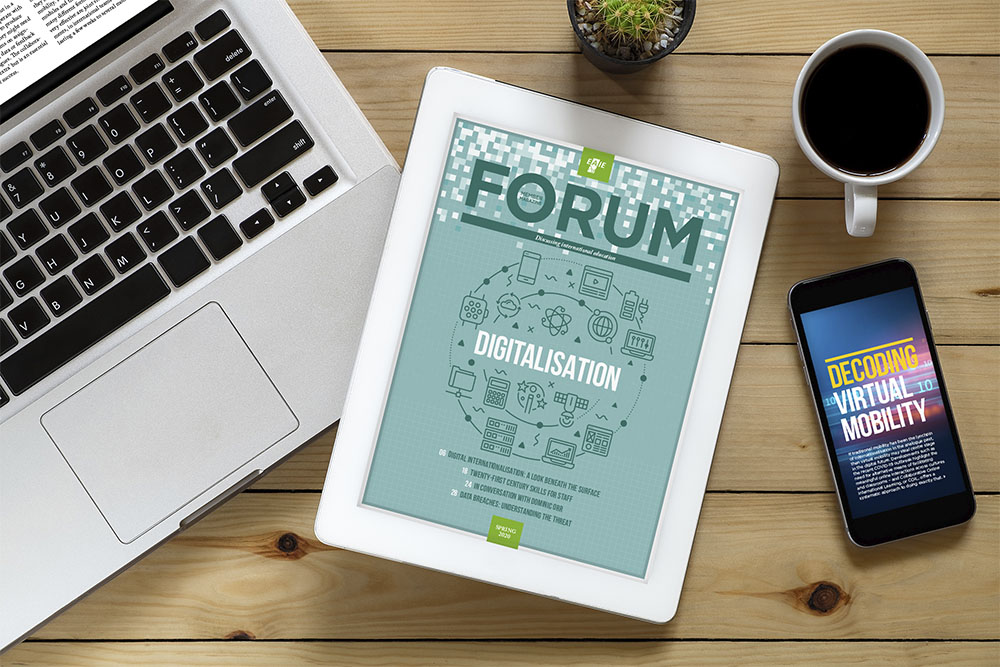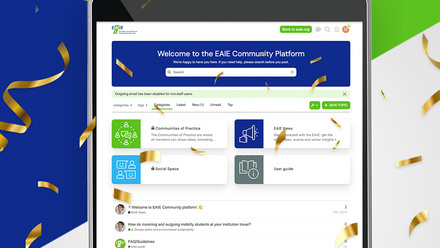Digitalisation in the days of COVID-19

Today we launch a special issue of Spring Forum dedicated to exploring the digitalisation of higher education. Due to the timeliness of this topic as we move deeper into the COVID-19 crisis, this issue of the EAIE member magazine will be made freely available for download by non-members as well. Today Editor Douglas Proctor kicks off Forum Week on the blog, and as the week goes on we will continue to highlight some of the insights and good practices within the magazine.
What effect is digitalisation having on your work in international education? And how is it re-shaping the nature of the student experience in international higher education? Today the role of digital technology in international higher education is taking on a whole new significance compared to even just a few short months ago when the call for submissions to this edition of Forum was opened. As campuses across Europe and around the world move temporarily to online delivery in response to the COVID-19 crisis, there could not be a more opportune time to reflect on the benefits and challenges of alternative virtual environments for internationalisation. In this edition of Forum, we look at a range of ways in which digital solutions are supporting professional and academic staff, as well as students, to re-frame international learning and collaboration.
Achieving our goals digitally
The increasing availability and accessibility of digital platforms also allows for efficiency gains in institutional processes, while blended learning options offer flexibility to learners and instructors alike. However, increasing digitalisation also leads to concerns about equity and access. Are all students now digital natives? Is stable online access a reality in all parts of the world? And what about effective training and support for professional and academic staff to allow them to leverage digital tools to best effect?
Digitalisation should not be a goal in itself, but rather we should harness it to achieve the goals of internationalisation
The EAIE is delighted that Dr Dominic Orr, an expert on open education and digital learning, agreed to be interviewed for this edition. Dr Orr is an Adjunct Professor for Management in Education at the University of Nova Gorica (Slovenia) and works as Research Lead at the Kiron educational platform and NGO. In his interview, he highlights that digitalisation should not be a goal in itself, but rather that we should harness digitalisation to achieve the goals of internationalisation and international education. As followers of research on international higher education will recognise, this closely echoes earlier reflections on internationalisation, which is not considered to be a goal in itself, but a means to enhance quality within and beyond the institution.
Setting the scene for this edition is Jon Rubin, Founder of the Collaborative Online International Learning (COIL) Center at the State University of New York (SUNY) and its Director from 2006–2017. Jon reflects on a series of metaphors to describe the digitalisation of internationalisation and challenges us to consider the digitised cultural bubbles we have created in a world where facts appear to have lost their solidity. Having thrown down this metaphorical gauntlet, a number of contributors to this edition then outline the teaching and learning transformations which digitalisation has enabled, from blended learning to digital classrooms and virtual exchange. Providing an example from the Australia-UK alliance between Monash University and the University of Warwick, Kate Aldred and Emma Barker give a fascinating insight into how two institutions on other sides of the planet have used digital technologies to build an international student research community.
Inclusive digitalisation
Later in the edition, a series of articles focuses on how digitalisation can be carefully deployed to ensure inclusivity, specifically for disadvantaged students and for those in developing countries. In parallel, another set of contributions shines a light on some of the administrative concerns at play, including the move to electronic academic records, questions about data breaches and the thorny question of digital literacy for staff. While academic and professional staff may find themselves lagging behind students in their willingness to adopt new technologies, Sally Wyatt points to a new interdisciplinary Bachelor's degree in Digital Society which is enabling students at Maastricht University (Netherlands) to gain the skills to critically assess, anticipate and shape the social, political and cultural impacts of digital transformations.
As always, I am grateful to my colleagues on the EAIE Publications Committee for their expert support in reviewing submissions for this edition of Forum. As we now adjust to the reality of working and teaching remotely (possibly for longer than we'd imagined), we hope that this edition will provide some inspiration for the interesting times ahead.




